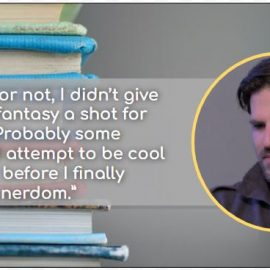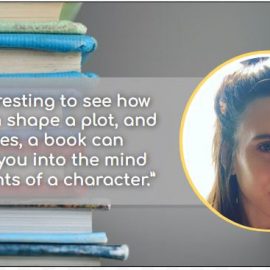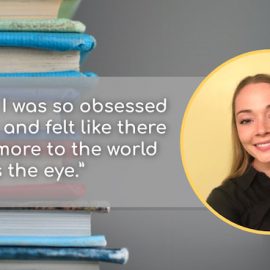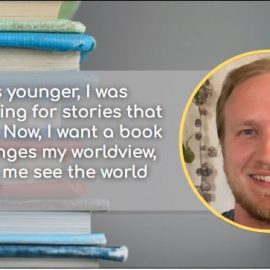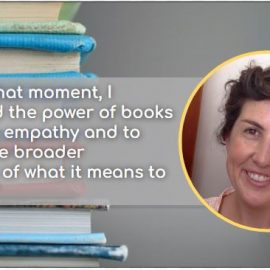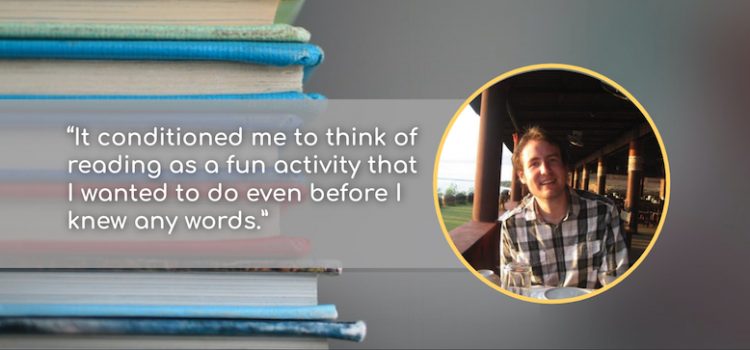
What’s the best thing about an old-fashioned British detective story? What does a book about Buddhist emptiness have in common with a book about computer science?
Daniel could tell you. Based in Burma, he’s a computer programmer at Shortform. We interviewed him recently to learn a bit about his relationship with books.
Our Interview With Daniel
Daniel reads everything from computer code to detective stories, and from Reddit to Nietzsche. Let’s dive into what he loves about all of it.
What’s your favorite book and why?
I can probably give a favorite book in each genre or category. Finding a favorite book overall is really hard because it’s not comparing apples to apples. I mean, if there’s a really good book about beekeeping and another really good book about 14th-century Islamic philosophy, on what reasonable basis can we even compare them?
But, if I give my favorite book for each category, I’ll be here all day. So, trying my best and ignoring how many truly great books scream for the title, I narrow it down to two current favorites: Seeing That Frees by Robert Burbea and Structure and Interpretation of Computer Programs by Gerald Jay Sussman and Hal Abelson.
The topics of those two are pretty far apart—Buddhist emptiness and computer science, respectively—but they have two things in common:
- Really good pedagogy, where everything unfolds in front of the learner as this perfectly paced exploration of the domain.
- They both gave me a real sense of beauty. Hard to explain, but if you “get it” as you read, the excitement is felt as something tangible running through your veins.
What are you reading these days?
I have two in progress—very slowly, I’m afraid:
- Girt by David Hunt—because I don’t know enough about the history of my own country. It’s good, but I think you have to be Australian to catch a lot of the references, so I’m not sure it would work as well if I lent it to my wife.
- Software Design for Flexibility by Chris Hanson and Gerald Jay Sussman—because anything by Sussman. I’m not sure whether I’m fully on board with all the techniques in that book that constitute their attempt at the solution, but the book is worth it anyway just for the discussion of the problem space—the stated problem being that software development is “multiplicative” rather than “additive.”
If you could have a dinner party with any three authors—dead or alive—who would they be and why?
“Dead or alive”? I don’t want any dead authors coming over for dinner. There’d be no time for discussing the finer points of their work, as I’d be too preoccupied with driving the silver stake through their heart or whatever you’re supposed to do with zombies.
More seriously, I really don’t need the dinner party, as I’m already sufficiently grateful for their existing bodies of work. Perhaps I’m just not a dinner party person. But, honestly, I don’t see a need for getting up close and personal with anyone’s eating habits. The point is the ideas, and authors by definition have already written the ideas they wanted to write.
What’s your favorite genre? Why does it intrigue you?
I like a good old-fashioned British detective story. The plot has to at least try to make some sense, of course, but I think it’s more about the aesthetic than anything else.
I’m also a sucker for the wise old man/wizard/genius trope, so anything that has a Dumbledore, Gandalf, Dr. Strange, Poirot, L, Laozi, or Buddha in it.
Are there any book genres or tropes that you dislike or refuse to read?
Anything found in an average airport bookstore tends to be dreadful. Lots of self-help. Terrible financial, business, and health advice. Celebrity bios. Shortform is actually really good because we tend to have summaries of the books in those genres that are actually decent.
But I’m not super into high literature either—writers writing for the sake of impressing other writers. I feel like you really have to be part of the club in order to know how to appreciate it. It reminds me a bit of how architects sometimes seem to want to design buildings that look the silliest rather than ones that are nicest to live in.
What’s your favorite way to read a book?
Oh, cloth hardcovers are the undisputed king. Though, in practice, a majority of my reading time is on my laptop these days, which I’m OK with.
What book do you think everyone should read in their lifetime?
May everyone find the book that would best help them right now! I like to think that such a book exists! But, because we all come from different backgrounds and have different needs and viewpoints, it’s not liable to be the same book for everyone.
The joy I found in Structure and Interpretation of Computer Programs, mentioned above as a favorite, is something I would love to share with everyone. But, realistically, if not everyone wants to be a computer scientist, then that’s just fine.
Who are your favorite authors?
I’ve already mentioned Burbea and Sussman for their pedagogy and sense of beauty. Let’s add Bill Bryson and Terry Pratchett for their humor and Nietzsche because the cocky bugger had a way with words.
Then I want to add Ellis Peters, Charlotte Brontë, Georgette Heyer, Rodney Brooks, Chris Crawford, and Douglas Hofstadter, purely because these names bring back wonderful memories of things that I read when I was younger.
How have your reading tastes changed over the years?
I have less time and patience for fiction now. I think I got started mostly on fiction when I was young—though I always liked “science books,” too.
I’m also reading more short—if not outright disjointed—things these days. Between documentation and memos for work—and Reddit or Hacker News comments to satisfy the news craving—it’s likely that I read more non-books than books.
I also spend more time reading code, which, while we rightly use the word “reading,” is a very different and less linear experience than reading prose.
Was there a specific book that sparked your love of reading?
I have memories from when I was very young of my mother reading novels before I knew how to, and she would occasionally let out the biggest laughs. This conditioned me to think of reading as a fun activity that I wanted to do even before I knew any words. So, in a way, we can say that whatever she was reading at that time was what sparked my love of reading!
Knowing her tastes, it must’ve been either a Regency romance or a British whodunnit. Those are genres that I also picked up later when I was able.
Do you have any guilty-pleasure books?
Let there be no guilt over any kind of reading!
What’s an interesting fact that you learned from a book recently?
Girt, which I’m reading now, is absolutely full of interesting tidbits that would answer this question well enough, but damned if I can remember anything right now.
Have any books you’ve read caused you to make any life changes or to develop any habits?
I’m not sure whether or not I can actually recommend it as a book. It’s written a bit strangely, and reading it—especially if you read it earnestly and don’t just think that the author is deluded or lying—feels like having a fever dream. But Mastering the Core Teachings of the Buddha kicked me into a meditation habit, so I owe it for that.
It’s highly personal and difficult to explain, but reading The Gateless Gate as a teenager helped solved a psychological problem and a case of chronic night terrors.
Thinking Forth influenced my programming style quite a bit, away from heavy abstraction and towards simpler, tighter, more linear code.
Do any of those count?
I believe that everything we take in influences us to a certain extent, even if it’s just subconscious. So, for example, it’s better to avoid advertisements because they mess with your mind even if you know they mess with your mind.
But, I’ve never had much luck in picking up things from self-help books, if that’s what you mean. “Use this six-point note-taking plan,” “sleep twice a day,” “take cold showers,” etc. No matter how good they make it sound, that kind of advice never sticks.
What’s your favorite quote from a book or an author?
“Programs must be written for people to read, and only incidentally for machines to execute.“ (From the preface to the first edition of Structure and Interpretation of Computer Programs)
What are your favorite book adaptations and why?
This is a boring answer, but The Lord of the Rings movies are just really pretty good—the lack of Tom Bombadil notwithstanding.
Hogfather, The Colour of Magic, and Going Postal take a certain amount of liberty with the source material. But, in my opinion, they nonetheless do great justice to the overall voice, the sense of whimsy, and the author’s wit—which makes sense, as Terry Pratchett was heavily involved in them, I think!
How do you go about reading a book that contains viewpoints you don’t agree with?
I see at least four possible reasons to read something:
- The information may be true—or I might believe it to be so.
- The information may be useful.
- The information may be popular.
- It’s work.
Point 1 is almost self-evident; we want to know what’s true so that we can better act in the world.
Point 2 is based on the idea that all models are wrong, but some are useful. For example, in electronic engineering, there’s the idea of an ideal op-amp. Such a thing is impossible to actually build. But, unlike with physically constructible op-amps, it’s easy to calculate their behavior. And, so long as we stay within certain limits, it gives reasonably close approximations. So, for that reason, we study them. Much how-to knowledge or methodology is also in this category. We actually don’t really need to find “the fundamentally best and ultimately true” Black Forest cake recipe; we just need a recipe book that kind of works so that we can get started.
Point 3 applies especially to political works. Unless you’re a hermit in a cave on the mountain, it’s useful to know what the opposition thinks and to be able to sensibly converse about popular topics.
Point 4 shouldn’t be dismissed as just money-grubbing. Information that just isn’t doing it for us right now might nonetheless be exactly and precisely what someone else needs to hear right now in order to improve their life or improve as a person.
Almost all books that we have to work with would surely fall under at least one of those four points. If we spent 100% of our time in an environment where we disagreed with everything, that would be very tiring. But that should fortunately not be the case.
Are there any books you had to read for Shortform that you thought you wouldn’t like and ended up loving?
Our summary of Tao Te Ching is written in a way that clashes with my own interpretation, but that made it more interesting than if I just agreed with it because it gave me new viewpoints.
What are your favorite books in the Shortform library and why?
Ask me again in 10 years when I’ve gone through it all!
Daniel’s Recommended Reading List
Religion/Spirituality/Meditation
- Seeing That Frees by Robert Burbea
- With Each and Every Breath by Ṭhānissaro Bhikkhu
- Right Concentration by Leigh Brasington
- Self-Liberation Through Seeing With Naked Awareness by Padmasambhava and Karma Lingpa
- Our Pristine Mind by Orgyen Chowang Rinpoche
- 無門關 (The Gateless Gate)
- The Zen Teaching of Huang Po by Huang Po (John Blofeld, Translator)
- ἀποφθέγματα τῶν πατέρων (The Sayings of the Desert Fathers)
- The Complete Mystical Works of Meister Eckhart by Meister Eckhart
Programming/Computer Science
- Structure and Interpretation of Computer Programs by Gerald Jay Sussman and Hal Abelson
- Let Over Lambda by Doug Hoyte
- Lisp in Small Pieces by Christian Queinnec
- Paradigms of AI Programming by Peter Norvig
- Thinking Forth by Leo Brodie
- Gödel, Escher, Bach: An Eternal Golden Braid by Douglas Hofstadter
- Chris Crawford on Game Design by Chris Crawford
Baking
- The Bread Baker’s Apprentice by Peter Reinhart
Poetry
- Bullocky by Judith Wright
About the Series
At Shortform, we want to give our employees names and faces so you can get to know the people who make the magic happen. That’s why we’re doing the Shortform Reads series, where we interview our employees and share their thoughts and opinions. You can check out more employee interviews here.

